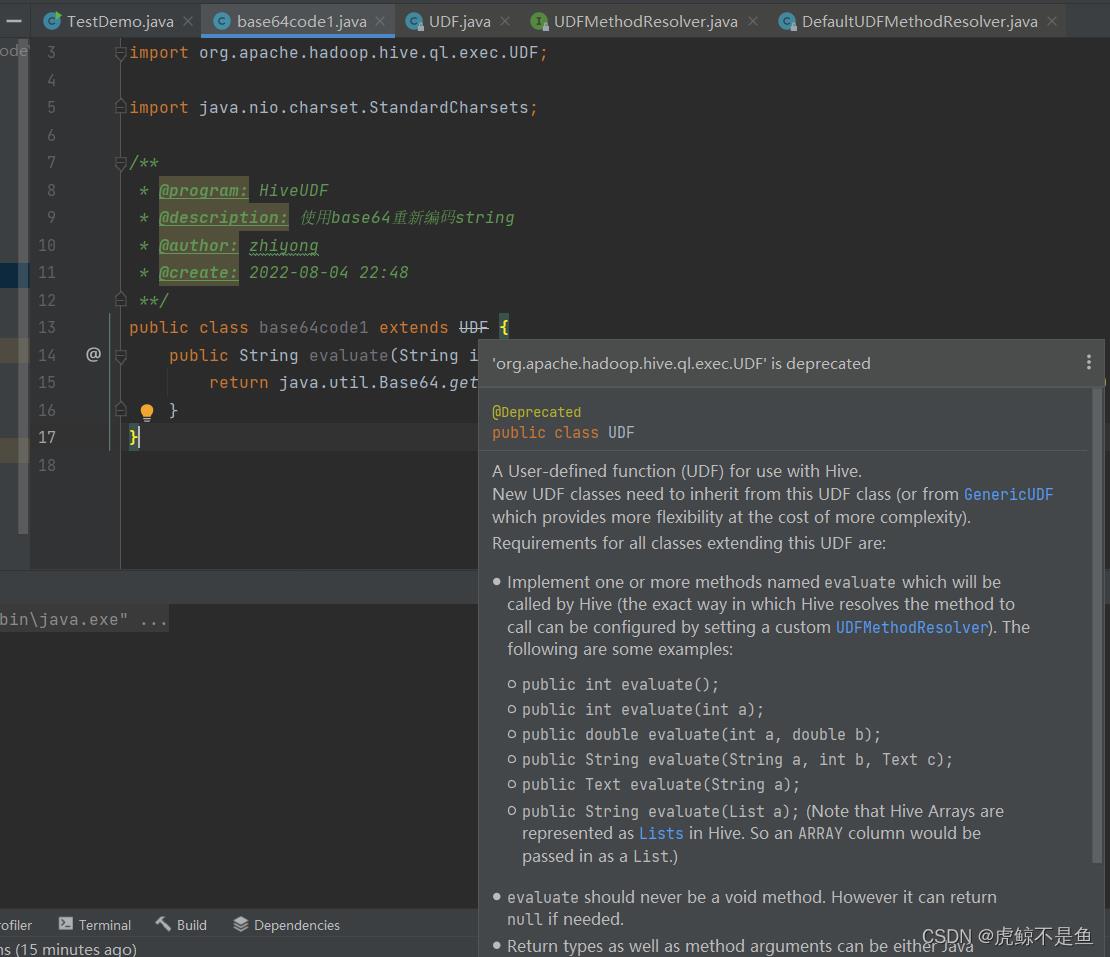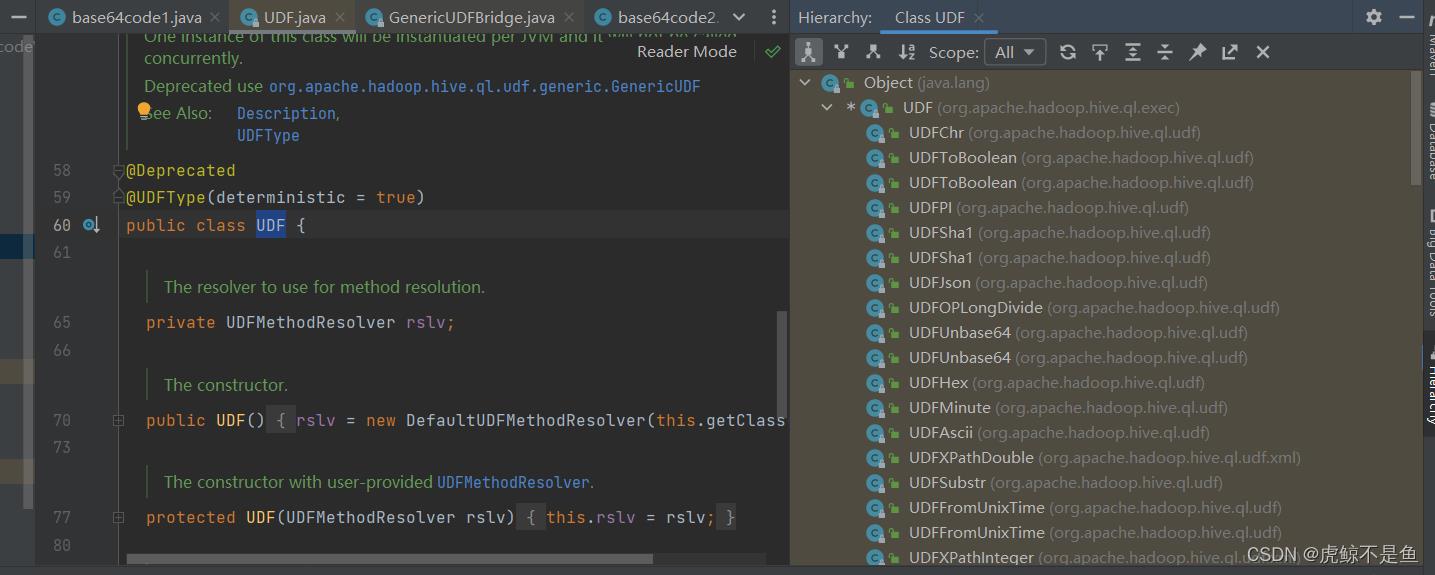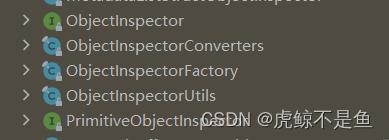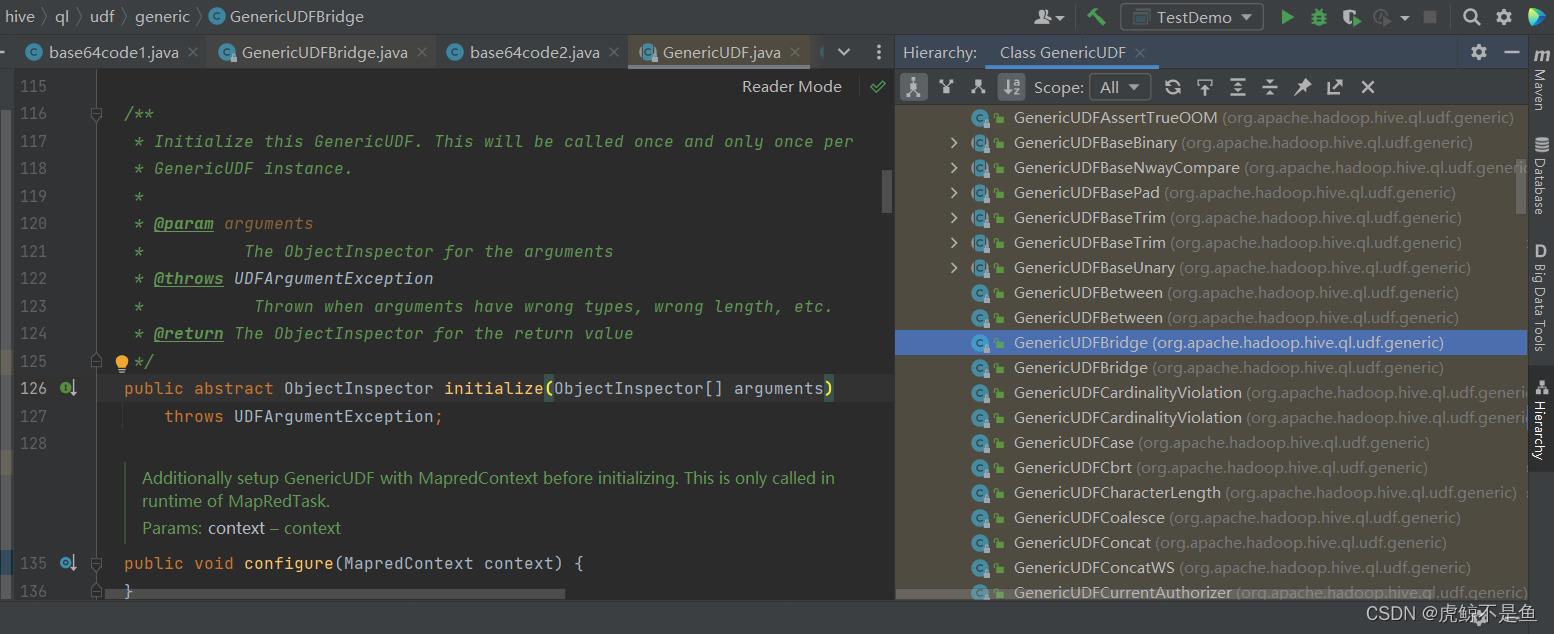使用Java继承UDF类或GenericUDF类给Hive3.1.2编写UDF实现编码解码加密解密并运行在USDP大数据集群
Posted 虎鲸不是鱼
tags:
篇首语:本文由小常识网(cha138.com)小编为大家整理,主要介绍了使用Java继承UDF类或GenericUDF类给Hive3.1.2编写UDF实现编码解码加密解密并运行在USDP大数据集群相关的知识,希望对你有一定的参考价值。
使用Java给Hive3.1.2编写UDF实现编码解码加密解密并运行在USDP大数据集群
背景
集群从CDH5.16升级到CDP7.1后,笔者用的阿里云DataPhin中台也升级了版本,之前的UDF不是很好用。某些UDF主要是让肤浅的SQL Boy们看不到Hive表某些机密字段的真实信息,防止出现机密信息泄露。笔者编写UDF函数,实现编码、解码、加密、解密,经测试在USDP集群的Apache Hive中可行。USDP的稳定性比Aliyun的中台貌似还好点。。。
原理
UDF
Hive的exec包中有UDF类,继承后用Java重写具体实现,并将编译好的Jar包放置在Hive路径,加载注册后即可像普通函数那样使用。
UDF简易案例
import org.apache.hadoop.hive.ql.exec.UDF;
import java.nio.charset.StandardCharsets;
/**
* @program: HiveUDF
* @description: 使用base64重新编码string
* @author: zhiyong
* @create: 2022-08-04 22:48
**/
public class base64code1 extends UDF
public String evaluate(String input)
return java.util.Base64.getEncoder().encodeToString(input.getBytes(StandardCharsets.UTF_8));
这样即可实现最简易的UDF。

但是很明显,这个方法在3.1.2的Hive已经过时了。按照注释应该继承那些继承了该UDF类的类才能不报过时。
继承了该UDF类的类:

随便点开一个:
package org.apache.hadoop.hive.ql.udf;
import org.apache.hadoop.hive.ql.exec.Description;
import org.apache.hadoop.hive.ql.exec.UDF;
import org.apache.hadoop.io.IntWritable;
import org.apache.hadoop.io.Text;
/**
* UDFAscii.
*
*/
@Description(name = "ascii",
value = "_FUNC_(str) - returns the numeric value of the first character"
+ " of str",
extended = "Returns 0 if str is empty or NULL if str is NULL\\n"
+ "Example:\\n"
+ " > SELECT _FUNC_('222') FROM src LIMIT 1;"
+ " 50\\n"
+ " > SELECT _FUNC_(2) FROM src LIMIT 1;\\n" + " 50")
public class UDFAscii extends UDF
private final IntWritable result = new IntWritable();
public IntWritable evaluate(Text s)
if (s == null)
return null;
if (s.getLength() > 0)
result.set(s.getBytes()[0]);
else
result.set(0);
return result;
其实也没啥特别的,这些自带的继承了UDF的类只是已经写好了evaluate方法,再次继承只需要重写该方法即可。好多个继承了UDF类的类包种都可以看到重写了evaluate方法,显然该方法很重要。
UDF源码
首先查看该过时方法:
package org.apache.hadoop.hive.ql.exec;
import org.apache.hadoop.hive.ql.udf.UDFType;
/**
* A User-defined function (UDF) for use with Hive.
* <p>
* New UDF classes need to inherit from this UDF class (or from @link
* org.apache.hadoop.hive.ql.udf.generic.GenericUDF GenericUDF which provides more flexibility at
* the cost of more complexity).
* <p>
* Requirements for all classes extending this UDF are:
* <ul>
* <li>Implement one or more methods named @code evaluate which will be called by Hive (the exact
* way in which Hive resolves the method to call can be configured by setting a custom @link
* UDFMethodResolver). The following are some examples:
* <ul>
* <li>@code public int evaluate();</li>
* <li>@code public int evaluate(int a);</li>
* <li>@code public double evaluate(int a, double b);</li>
* <li>@code public String evaluate(String a, int b, Text c);</li>
* <li>@code public Text evaluate(String a);</li>
* <li>@code public String evaluate(List<Integer> a); (Note that Hive Arrays are represented as
* @link java.util.List Lists in Hive.
* So an @code ARRAY<int> column would be passed in as a @code List<Integer>.)</li>
* </ul>
* </li>
* <li>@code evaluate should never be a void method. However it can return @code null if
* needed.
* <li>Return types as well as method arguments can be either Java primitives or the corresponding
* @link org.apache.hadoop.io.Writable Writable class.</li>
* </ul>
* One instance of this class will be instantiated per JVM and it will not be called concurrently.
*
* @see Description
* @see UDFType
*
* @deprecated use @link org.apache.hadoop.hive.ql.udf.generic.GenericUDF
*/
@Deprecated
@UDFType(deterministic = true)
public class UDF
/**
* The resolver to use for method resolution.
*/
private UDFMethodResolver rslv;
/**
* The constructor.
*/
public UDF()
rslv = new DefaultUDFMethodResolver(this.getClass());
/**
* The constructor with user-provided @link UDFMethodResolver.
*/
protected UDF(UDFMethodResolver rslv)
this.rslv = rslv;
/**
* Sets the resolver.
*
* @param rslv The method resolver to use for method resolution.
*/
public void setResolver(UDFMethodResolver rslv)
this.rslv = rslv;
/**
* Get the method resolver.
*/
public UDFMethodResolver getResolver()
return rslv;
/**
* This can be overridden to include JARs required by this UDF.
*
* @see org.apache.hadoop.hive.ql.udf.generic.GenericUDF#getRequiredJars()
* GenericUDF.getRequiredJars()
*
* @return an array of paths to files to include, @code null by default.
*/
public String[] getRequiredJars()
return null;
/**
* This can be overridden to include files required by this UDF.
*
* @see org.apache.hadoop.hive.ql.udf.generic.GenericUDF#getRequiredFiles()
* GenericUDF.getRequiredFiles()
*
* @return an array of paths to files to include, @code null by default.
*/
public String[] getRequiredFiles()
return null;
发现一个使用频繁的类:
package org.apache.hadoop.hive.ql.exec;
import java.lang.reflect.Method;
import java.util.List;
import org.apache.hadoop.hive.serde2.typeinfo.TypeInfo;
/**
* The UDF Method resolver interface. A user can plugin a resolver to their UDF
* by implementing the functions in this interface. Note that the resolver is
* stored in the UDF class as an instance variable. We did not use a static
* variable because many resolvers maintain the class of the enclosing UDF as
* state and are called from a base class e.g. UDFBaseCompare. This makes it
* very easy to write UDFs that want to do resolution similar to the comparison
* operators. Such UDFs just need to extend UDFBaseCompare and do not have to
* care about the UDFMethodResolver interface. Same is true for UDFs that want
* to do resolution similar to that done by the numeric operators. Such UDFs
* simply have to extend UDFBaseNumericOp class. For the default resolution the
* UDF implementation simply needs to extend the UDF class.
*/
@Deprecated
public interface UDFMethodResolver
/**
* Gets the evaluate method for the UDF given the parameter types.
*
* @param argClasses
* The list of the argument types that need to matched with the
* evaluate function signature.
*/
Method getEvalMethod(List<TypeInfo> argClasses) throws UDFArgumentException;
显然这是个接口,继续查看具体的实现类:

主要是这3种:
显然正常情况应该是使用:
/*
* Licensed to the Apache Software Foundation (ASF) under one
* or more contributor license agreements. See the NOTICE file
* distributed with this work for additional information
* regarding copyright ownership. The ASF licenses this file
* to you under the Apache License, Version 2.0 (the
* "License"); you may not use this file except in compliance
* with the License. You may obtain a copy of the License at
*
* http://www.apache.org/licenses/LICENSE-2.0
*
* Unless required by applicable law or agreed to in writing, software
* distributed under the License is distributed on an "AS IS" BASIS,
* WITHOUT WARRANTIES OR CONDITIONS OF ANY KIND, either express or implied.
* See the License for the specific language governing permissions and
* limitations under the License.
*/
package org.apache.hadoop.hive.ql.exec;
import java.lang.reflect.Method;
import java.util.List;
import org.apache.hadoop.hive.serde2.typeinfo.TypeInfo;
/**
* The default UDF Method resolver. This resolver is used for resolving the UDF
* method that is to be used for evaluation given the list of the argument
* types. The getEvalMethod goes through all the evaluate methods and returns
* the one that matches the argument signature or is the closest match. Closest
* match is defined as the one that requires the least number of arguments to be
* converted. In case more than one matches are found, the method throws an
* ambiguous method exception.
*/
public class DefaultUDFMethodResolver implements UDFMethodResolver
/**
* The class of the UDF.
*/
private final Class<? extends UDF> udfClass;
/**
* Constructor. This constructor sets the resolver to be used for comparison
* operators. See @link UDFMethodResolver
*/
public DefaultUDFMethodResolver(Class<? extends UDF> udfClass)
this.udfClass = udfClass;
/**
* Gets the evaluate method for the UDF given the parameter types.
*
* @param argClasses
* The list of the argument types that need to matched with the
* evaluate function signature.
*/
@Override
public Method getEvalMethod(List<TypeInfo> argClasses) throws UDFArgumentException
return FunctionRegistry.getMethodInternal(udfClass, "evaluate", false,
argClasses);
这个工具类的方法:
package org.apache.hadoop.hive.ql.exec;
public final class FunctionRegistry
/**
* This method is shared between UDFRegistry and UDAFRegistry. methodName will
* be "evaluate" for UDFRegistry, and "aggregate"/"evaluate"/"evaluatePartial"
* for UDAFRegistry.
* @throws UDFArgumentException
*/
public static <T> Method getMethodInternal(Class<? extends T> udfClass,
String methodName, boolean exact, List<TypeInfo> argumentClasses)
throws UDFArgumentException
List<Method> mlist = new ArrayList<Method>();
for (Method m : udfClass.getMethods())
if (m.getName().equals(methodName))
mlist.add(m);
return getMethodInternal(udfClass, mlist, exact, argumentClasses);
显然底层是通过org.apache.hadoop.hive.ql.exec包的FunctionRegistry工具类的getMethodInternal这个静态方法,反射加载了所有继承了org.apache.hadoop.hive.ql.exec.UDF类并且方法名称为evaluate的所有方法。所以事实上可以进行类的重载,但是UDF函数的稳定性一直欠佳,笔者不喜欢这么做。到这一步就解释了为何继承UDF类后方法名称必须是evaluate。
而udfClass.getMethods()方法:
package java.lang;
public final class Class<T> implements java.io.Serializable,
GenericDeclaration,
Type,
AnnotatedElement
/**
* Returns an array containing @code Method objects reflecting all the
* public methods of the class or interface represented by this @code
* Class object, including those declared by the class or interface and
* those inherited from superclasses and superinterfaces.
*
* <p> If this @code Class object represents a type that has multiple
* public methods with the same name and parameter types, but different
* return types, then the returned array has a @code Method object for
* each such method.
*
* <p> If this @code Class object represents a type with a class
* initialization method @code <clinit>, then the returned array does
* <em>not</em> have a corresponding @code Method object.
*
* <p> If this @code Class object represents an array type, then the
* returned array has a @code Method object for each of the public
* methods inherited by the array type from @code Object. It does not
* contain a @code Method object for @code clone().
*
* <p> If this @code Class object represents an interface then the
* returned array does not contain any implicitly declared methods from
* @code Object. Therefore, if no methods are explicitly declared in
* this interface or any of its superinterfaces then the returned array
* has length 0. (Note that a @code Class object which represents a class
* always has public methods, inherited from @code Object.)
*
* <p> If this @code Class object represents a primitive type or void,
* then the returned array has length 0.
*
* <p> Static methods declared in superinterfaces of the class or interface
* represented by this @code Class object are not considered members of
* the class or interface.
*
* <p> The elements in the returned array are not sorted and are not in any
* particular order.
*
* @return the array of @code Method objects representing the
* public methods of this class
* @throws SecurityException
* If a security manager, <i>s</i>, is present and
* the caller's class loader is not the same as or an
* ancestor of the class loader for the current class and
* invocation of @link SecurityManager#checkPackageAccess
* s.checkPackageAccess() denies access to the package
* of this class.
*
* @jls 8.2 Class Members
* @jls 8.4 Method Declarations
* @since JDK1.1
*/
@CallerSensitive
public Method[] getMethods() throws SecurityException
checkMemberAccess(Member.PUBLIC, Reflection.getCallerClass(), true);
return copyMethods(privateGetPublicMethods());
这个反射方法从JDK1.0时代就有了。而且反射还会抛异常:
package java.lang;
/**
* Thrown by the security manager to indicate a security violation.
*
* @author unascribed
* @see java.lang.SecurityManager
* @since JDK1.0
*/
public class SecurityException extends RuntimeException
底层会抛出运行时异常。
GenericUDF初探
既然直接继承UDF类是过时的做法,那么根据注释可以继承GenericUDF类包,虽然不推荐使用,但目前流行使用这种复杂的类包。
package com.zhiyong.hiveUDF;
import org.apache.hadoop.hive.ql.exec.UDFArgumentException;
import org.apache.hadoop.hive.ql.metadata.HiveException;
import org.apache.hadoop.hive.ql.udf.generic.GenericUDF;
import org.apache.hadoop.hive.serde2.objectinspector.ObjectInspector;
/**
* @program: HiveUDF
* @description: 测试UDF
* @author: zhiyong
* @create: 2022-08-05 00:10
**/
public class base64code2 extends GenericUDF
@Override
public ObjectInspector initialize(ObjectInspector[] arguments) throws UDFArgumentException
return null;
@Override
public Object evaluate(DeferredObject[] arguments) throws HiveException
return null;
@Override
public String getDisplayString(String[] children)
return null;
显然继承了GenericUDF就必须重写3个方法,并且导入4个类。根据类名称,initialize应该是初始化,evaluate是具体实现的算法,getDisplayString应该是类似打印日志之类的操作。
org.apache.hadoop.hive.serde2.objectinspector包的ObjectInspector类显然有必要看看。
//
// Source code recreated from a .class file by IntelliJ IDEA
// (powered by FernFlower decompiler)
//
package org.apache.hadoop.hive.serde2.objectinspector;
import org.apache.hadoop.hive.common.classification.InterfaceAudience.Public;
import org.apache.hadoop.hive.common.classification.InterfaceStability.Stable;
@Public
@Stable
public interface ObjectInspector extends Cloneable
String getTypeName();
ObjectInspector.Category getCategory();
public static enum Category
PRIMITIVE,
LIST,
MAP,
STRUCT,
UNION;
private Category()
显然这是个接口,里边还定义了一个枚举体Category。
事实上,该包还有很多类:

名称差不多的类:

例如:ObjectInspectorConverters内部是转换类型的方法。ObjectInspectorFactory类与ObjectInspectorUtils类是工具类,内部有很多静态方法。
GenericUDF源码
package org.apache.hadoop.hive.ql.udf.generic;
/**
* A Generic User-defined function (GenericUDF) for the use with Hive.
*
* New GenericUDF classes need to inherit from this GenericUDF class.
*
* The GenericUDF are superior to normal UDFs in the following ways: 1. It can
* accept arguments of complex types, and return complex types. 2. It can accept
* variable length of arguments. 3. It can accept an infinite number of function
* signature - for example, it's easy to write a GenericUDF that accepts
* array<int>, array<array<int>> and so on (arbitrary levels of nesting). 4. It
* can do short-circuit evaluations using DeferedObject.
*/
@InterfaceAudience.Public
@InterfaceStability.Stable
@UDFType(deterministic = true)
public abstract class GenericUDF implements Closeable
显然这是个抽象类,虽然是共有的但是并不能直接使用。
这个抽象类有很多继承类:

至于为神马找到这2个类,其实笔者是根据Hive的Error Log堆栈找到的。。。。。。
这2个同名类的区别是:

Hive版本不同,CDH5.16都要淘汰了,2.3.7的老版本已经没有继续看的必要。
package org.apache.hadoop.hive.ql.udf.generic;
/**
* GenericUDFBridge encapsulates UDF to provide the same interface as
* GenericUDF.
*
* Note that GenericUDFBridge implements Serializable because the name of the
* UDF class needs to be serialized with the plan.
*
*/
public class GenericUDFBridge extends GenericUDF implements Serializable
private static final long serialVersionUID = 4994861742809511113L;
/**
* The name of the UDF.
*/
private String udfName;
/**
* Whether the UDF is an operator or not. This controls how the display string
* is generated.
*/
private boolean isOperator;
/**
* The underlying UDF class Name.
*/
private String udfClassName;
/**
* The underlying method of the UDF class.
*/
private transient Method udfMethod;
/**
* Helper to convert the parameters before passing to udfMethod.
*/
private transient ConversionHelper conversionHelper;
/**
* The actual udf object.
*/
private transient UDF udf;
/**
* The non-deferred real arguments for method invocation.
*/
private transient Object[] realArguments;
private transient UdfWhitelistChecker udfChecker;
/**
* Create a new GenericUDFBridge object.
*
* @param udfName
* The name of the corresponding udf.
* @param isOperator true for operators
* @param udfClassName java class name of UDF
*/
public GenericUDFBridge(String udfName, boolean isOperator,
String udfClassName)
this.udfName = udfName;
this.isOperator = isOperator;
this.udfClassName = udfClassName;
// For Java serialization only
public GenericUDFBridge()
public void setUdfName(String udfName)
this.udfName = udfName;
@Override
public String getUdfName()
return udfName;
public String getUdfClassName()
return udfClassName;
public void setUdfClassName(String udfClassName)
this.udfClassName = udfClassName;
public boolean isOperator()
return isOperator;
public void setOperator(boolean isOperator)
this.isOperator = isOperator;
public Class<? extends UDF> getUdfClass()
try
return getUdfClassInternal();
catch (ClassNotFoundException e)
throw new RuntimeException(e);
/** Gets the UDF class and checks it against the whitelist, if any. */
private Class<? extends UDF> getUdfClassInternal()
throws ClassNotFoundException
@SuppressWarnings("unchecked")
Class<? extends UDF> clazz = (Class<? extends UDF>) Class.forName(
udfClassName, true, Utilities.getSessionSpecifiedClassLoader());
if (udfChecker != null && !udfChecker.isUdfAllowed(clazz))
throw new SecurityException("UDF " + clazz.getCanonicalName() + " is not allowed");
return clazz;
@Override
public ObjectInspector initialize(ObjectInspector[] arguments) throws UDFArgumentException
try
udf = (UDF)getUdfClassInternal().newInstance(以上是关于使用Java继承UDF类或GenericUDF类给Hive3.1.2编写UDF实现编码解码加密解密并运行在USDP大数据集群的主要内容,如果未能解决你的问题,请参考以下文章